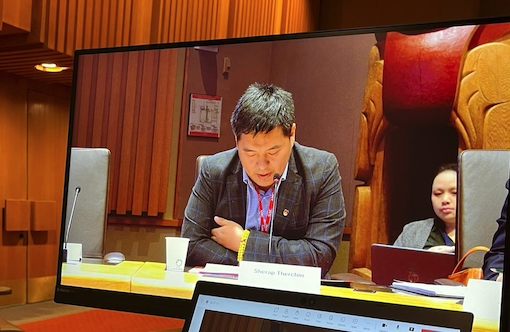Ottawa, November 20, 2023 – The China Human Rights Forum, organized through a collaboration among the Greater China Political Division of Global Affairs Canada, the University of Ottawa’s Graduate School of Public and International Affairs, Centre for International Policy Studies, and East Asian Studies Network, tackled pressing issues such as assimilation, forced labour, and transnational repression, emphasizing accountability measures. A significant segment was dedicated to the education policy, language, and the impact of boarding schools in Tibet, highlighting their profound effects on the cultural and linguistic heritage of the Tibetan people.
Representing the Canada Tibet Committee, the executive director Sherap Therchin highlighted the challenges of education policy in Tibet. Alongside the esteemed scholars Dr. Sophie Richardson and Dr. Gyalo, the effort to bring international attention to the forced assimilation of Tibetan children through education policies and boarding schools was underscored.
The Canadian government and parliament’s recognition of the need to end such practices was noted, reflecting global solidarity and concern for the Tibetan cause. The forum shone a light on the critical threat to Tibetan culture and language under policies aimed at assimilating Tibetans into the dominant Han Chinese cultural identity. The aggressive push towards cultural imperialism under Xi Jinping’s leadership was critically examined, showing the systematic efforts to diminish Tibetan cultural identity across various demographics.
The conversation then shifted to the fundamental human right to education, anchored in international treaties and conventions that protect minority languages. The discussion pointed out China’s responsibilities under these frameworks, starkly contrasting with policies that diminish Tibetan language and culture.
Drawing parallels with Canada’s experiences with indigenous languages and cultural policies, initiatives such as the Indigenous Languages Act and educational policies in Quebec were outlined. The significance of these initiatives to the Tibetan context was emphasized, suggesting potential for shared learning and collaborative support.
The forum critically evaluated the discrepancy between China’s stated policies on regional national autonomy and the actual implementation of policies that undermine Tibetan language and cultural education. Recommendations were made for Canada to leverage its historical experiences and lessons learned to support Tibetan cultural and linguistic rights. This includes advocating for research, dialogue, and educational support initiatives.
Concerns regarding religious freedom and the rights to Tibetan Buddhist practices, especially the issue of the Dalai Lama’s reincarnation, were prominently addressed. The forum delved into the paradox of an atheist, communist regime claiming authority over spiritual matters, using the abduction of Gedhun Choekyi Nyima and the appointment of a state-selected Panchen Lama as prime examples of overreach.
The China Human Rights Forum on Tibet provided a comprehensive overview of the critical challenges Tibet faces under Chinese policies, from cultural assimilation to the infringement of religious freedoms. The discussions highlighted the importance of international solidarity, informed dialogue, and policy advocacy in safeguarding the rights and identity of the Tibetan people. The outlined recommendations aim to foster a collaborative approach, leveraging Canada’s experience and resources to support the Tibetan cause internationally.
By Sherap Therchin

